Small Countries Can Never Get What Great Britain Got
Adelina Marini, March 3, 2016
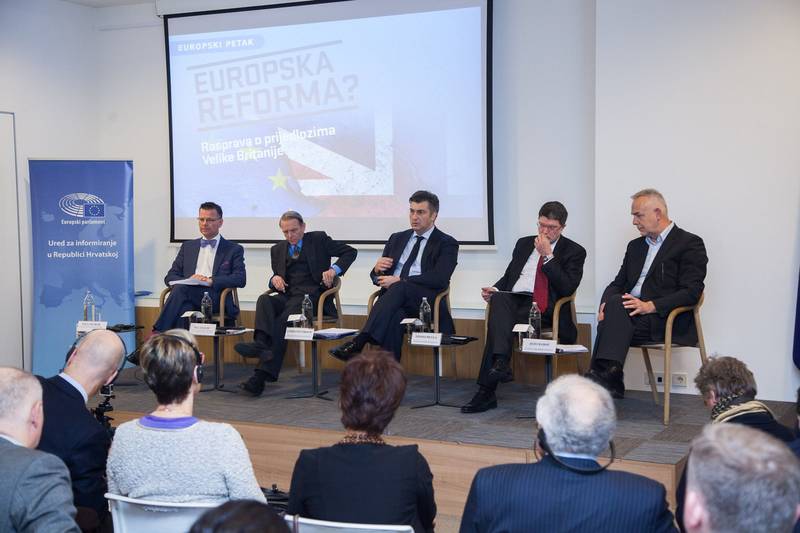 What Great Britain negotiated at the 18-19 February summit in Brussels would be impossible to negotiate for any country with less than 40 million population, said Croatian MEP Andrej Plenković (EPP) during a discussion on the deal that was brokered, organised in Zagreb by the European Parliament information office last week. Plenković is deputy-chairman of the influential foreign affairs committee of the EP and leads the delegation for relations with the Ukraine. His position was backed by Jozo Radoš, member of the Liberals group in the EP. Andrej Plenković expressed his disagreement at the implementation of such referendums, because they are extremely risky, concentrate more on the context, rather than the substance of a given agreement, treaty, or something else. The last referendums in the EU ended badly, including the Greek referendum of last year and also the votes in The Netherlands and France in 2005, which caused the dismissal of the project for a European constitution, reminded Mr Plenković.
What Great Britain negotiated at the 18-19 February summit in Brussels would be impossible to negotiate for any country with less than 40 million population, said Croatian MEP Andrej Plenković (EPP) during a discussion on the deal that was brokered, organised in Zagreb by the European Parliament information office last week. Plenković is deputy-chairman of the influential foreign affairs committee of the EP and leads the delegation for relations with the Ukraine. His position was backed by Jozo Radoš, member of the Liberals group in the EP. Andrej Plenković expressed his disagreement at the implementation of such referendums, because they are extremely risky, concentrate more on the context, rather than the substance of a given agreement, treaty, or something else. The last referendums in the EU ended badly, including the Greek referendum of last year and also the votes in The Netherlands and France in 2005, which caused the dismissal of the project for a European constitution, reminded Mr Plenković.
Processes like the referendums are difficult to control, especially if they focus on oddities like the power of vacuum cleaners or the like. He recalled the case of the hysterics around the Polish plumber, by saying that it was exactly the threat of the cheap labour of Polish workers that was the reason the project for a European constitution was rejected in the French referendum. Jozo Radoš commented that the United Kingdom received a lot with the deal. He agrees that smaller states could never receive as much and this fact, quite understandably, is causing frustration in certain states or certain political groups. He feels the deal with Great Britain is both a community win and a failure, for it raises the questions exactly what the EU is, what it should and what it could be.
If Great Britain walks out, there exists the possibility that the EU will for the most part keep its current outlook, which in the words of Jozo Radoš does not look like a tempting perspective – a complex, inefficient, having thousands of problems, ineffective in making decisions. With this situation we will have to ask ourselves what we can and whether we should leave the union as is, namely complicated and inefficient, because we cannot make it better, or move towards having a two-speed EU. All of this means placing fundamental questions on the table, including opening of the founding treaties, said the liberal MEP. The remaining of Great Britain has its own flaws, for it further complicates and entangles the Union, not to mention giving a bad example to other states. When things are placed on the scales, however, the remaining is preferable, added Mr Radoš, because the risks, which reveal themselves both for the United Kingdom and the EU are too unclear.
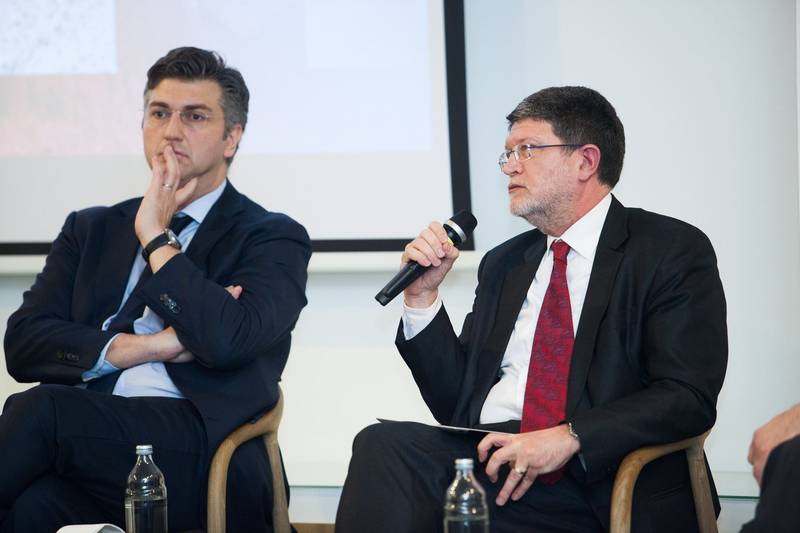 According to Andrej Plenković, a Europe of more speeds is not a good idea. There already are two or even more speeds – Schengen, the euro area, Great Britain’s exceptions et cetera. They are however not good for small countries like Croatia. Tonino Picula of the Socialists and Democrats group, former foreign minister of Croatia (2000-2003) said that he is much more worried by the fragmentation of the EU, which would formally stay together, but will be unable to react to the multitude of problems. He also expressed his concern by the fact that even Croatia’s neighbouring countries, which are already candidates, no longer see the former charm of the EU. Tonino Picula never named anyone, but the word is about the statement of Serbian PM Aleksandar Vučić from last week at the Western Balkans summit with the participation of the European Bank for Reconstruction and Development, which went that the EU had lost its magic attractiveness.
According to Andrej Plenković, a Europe of more speeds is not a good idea. There already are two or even more speeds – Schengen, the euro area, Great Britain’s exceptions et cetera. They are however not good for small countries like Croatia. Tonino Picula of the Socialists and Democrats group, former foreign minister of Croatia (2000-2003) said that he is much more worried by the fragmentation of the EU, which would formally stay together, but will be unable to react to the multitude of problems. He also expressed his concern by the fact that even Croatia’s neighbouring countries, which are already candidates, no longer see the former charm of the EU. Tonino Picula never named anyone, but the word is about the statement of Serbian PM Aleksandar Vučić from last week at the Western Balkans summit with the participation of the European Bank for Reconstruction and Development, which went that the EU had lost its magic attractiveness.
Today, whoever wants to advance politically, begins shouting at the EU, he said. Once marginal eurosceptic political parties are currently mainstream in the EU. This is the problem, commented the left-wing MEP. His forecast is that regardless of the outcome of the British referendum, social Europe is going to change. A signal for this is the fact that social benefits for EU citizens in Great Britain turned into a central subject of both the deal and the campaign. And it all started from David Cameron needing to keep his leading position in the Conservative party and winning the elections. The referendum, however, has turned into inevitability, and all the rest now are just additions, continued the former foreign minister of Croatia. According to him, the raising of the social subject is not an incident, but a trend. Whatever the result of the referendum is, the EU will hardly return to what it looked like 15 years ago, thinks Tonino Picula.
Regarding the EU enlargement, he pointed out that EC President Jean-Claude Juncker (Luxembourg, EPP) missed mentioning in his famous speech in front of the European Parliament after his election, when he said he did not expect a new enlargement of the EU during his term, that it was possible the EU to shrink during his term. Tonino Picula saw more serious challenges to the EU, one of the largest ones being that the authoritarianisation of states around the EU, like Turkey and Russia, is having an effect within the EU, where different politicians resort to copying this model, aiming to stay in power. Jozo Radoš put forward another very important problem in the context of the fact that Turkey managed to win an unfreezing of the negotiation process in exchange for more active cooperation in dealing with the refugee crisis.
Today, the model of integration of Muslims in European society turned out unsuccessful. The EU has the least influence in the Middle East, and this is a region, which affects the EU the most, but the union is completely impotent there. The question is whether Turkey is the country, which should be the EU’s partner regarding influence in the Middle East and at the same time could it be a bridge to 10 million Muslims at the Western Balkans and the Muslim world in the EU, which at some point needs to be integrated and not 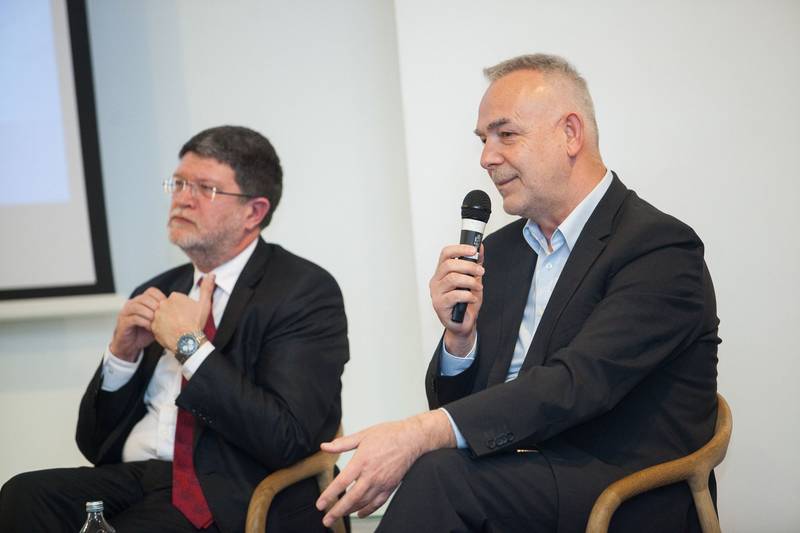 sprouting problems every few years. This is a large question, said Mr Radoš, thus it is important that the EU is well organised to have the strength to make a decision regarding Turkey.
sprouting problems every few years. This is a large question, said Mr Radoš, thus it is important that the EU is well organised to have the strength to make a decision regarding Turkey.
The discussion caused open interest, but put forward more questions than it answered. The British ambassador to Zagreb, H.E. Ian Cliff, admitted that the options were either jumping into the unknown, if the Brexit is chosen, or the well familiar – the EU with all its flaws, but also possibilities to influence changes in it.
Translated by Stanimir Stoev
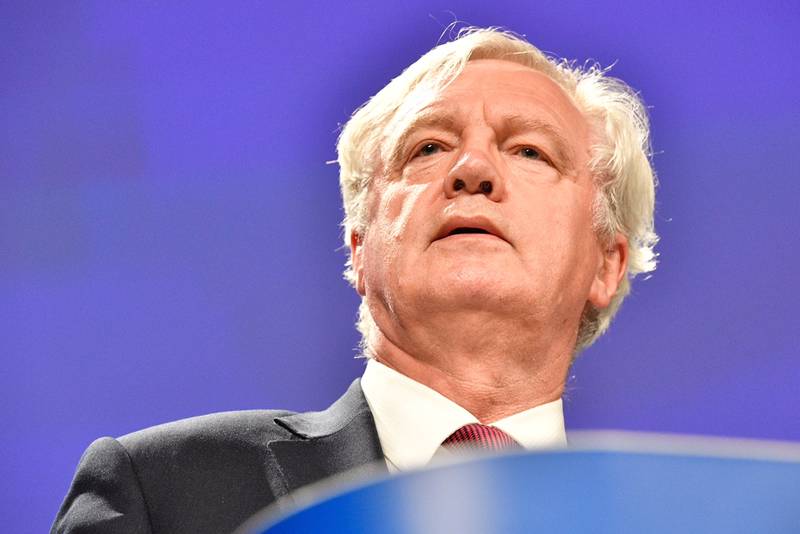 David Davis | © European Commission
David Davis | © European Commission Angela Merkel | © Council of the EU
Angela Merkel | © Council of the EU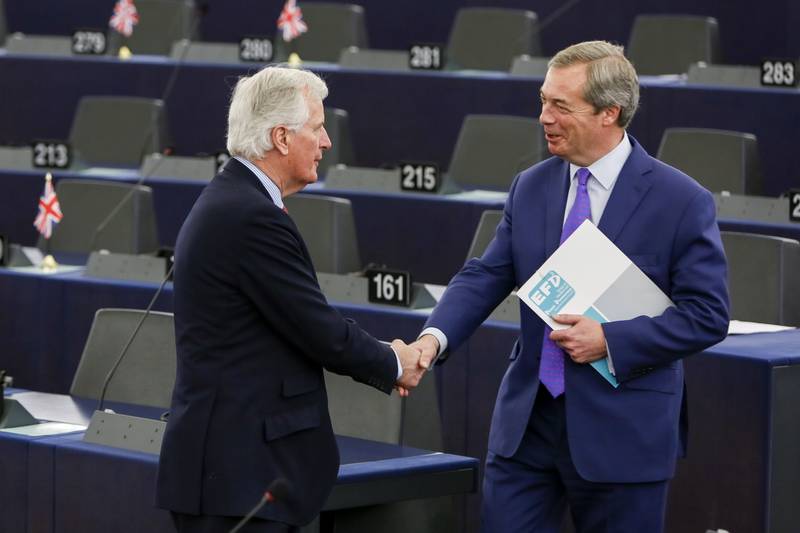 Michel Barnier, Nigel Farage | © European Parliament
Michel Barnier, Nigel Farage | © European Parliament Kolinda Grabar-Kitarovic | © KGK
Kolinda Grabar-Kitarovic | © KGK Jozo Rados | © European Parliament
Jozo Rados | © European Parliament Aleksandar Vucic, Andrej Plenkovic | © Vlada RH
Aleksandar Vucic, Andrej Plenkovic | © Vlada RH